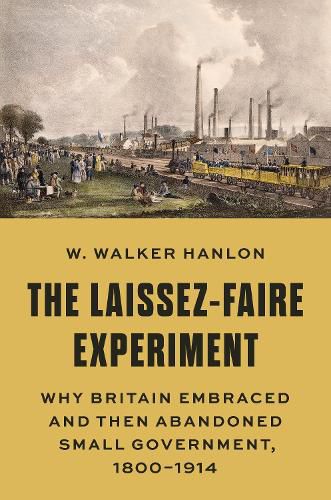Readings Newsletter
Become a Readings Member to make your shopping experience even easier.
Sign in or sign up for free!
You’re not far away from qualifying for FREE standard shipping within Australia
You’ve qualified for FREE standard shipping within Australia
The cart is loading…






Why Britain's attempt at small government proved unable to cope with the challenges of the modern world.
In the nineteenth century, as Britain attained a leading economic and political position in Europe, British policymakers embarked on a bold experiment with small and limited government. By the outbreak of the First World War, however, this laissez-faire philosophy of government had been abandoned and the country had taken its first steps toward becoming a modern welfare state. This book tells the story of Britain's laissez-faire experiment, examining why it was done, how it functioned, and why it was ultimately rejected in favour of a more interventionist form of governance.
Blending insights from modern economic theory with a wealth of historical evidence, W. Walker Hanlon traces the slow expansion of government intervention across a broad spectrum of government functions in order to understand why and how Britain gave up on laissez-faire. It was not abandoned because Britain's leaders lost faith in small government as some have suggested, nor did it collapse under the growing influence of working-class political power. Instead, Britain's move away from small government was a pragmatic and piecemeal response by policymakers who often deeply believed in laissez-faire to the economic forces unleashed by the Industrial Revolution.
$9.00 standard shipping within Australia
FREE standard shipping within Australia for orders over $100.00
Express & International shipping calculated at checkout
Why Britain's attempt at small government proved unable to cope with the challenges of the modern world.
In the nineteenth century, as Britain attained a leading economic and political position in Europe, British policymakers embarked on a bold experiment with small and limited government. By the outbreak of the First World War, however, this laissez-faire philosophy of government had been abandoned and the country had taken its first steps toward becoming a modern welfare state. This book tells the story of Britain's laissez-faire experiment, examining why it was done, how it functioned, and why it was ultimately rejected in favour of a more interventionist form of governance.
Blending insights from modern economic theory with a wealth of historical evidence, W. Walker Hanlon traces the slow expansion of government intervention across a broad spectrum of government functions in order to understand why and how Britain gave up on laissez-faire. It was not abandoned because Britain's leaders lost faith in small government as some have suggested, nor did it collapse under the growing influence of working-class political power. Instead, Britain's move away from small government was a pragmatic and piecemeal response by policymakers who often deeply believed in laissez-faire to the economic forces unleashed by the Industrial Revolution.